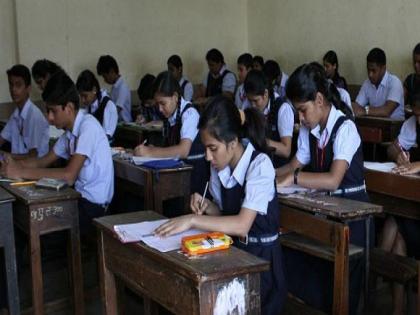Maharashtra State Board to Include Manache Shlok and Bhagavad Gita in School Syllabus
By Lokmat English Desk | Published: May 24, 2024 01:39 PM2024-05-24T13:39:05+5:302024-05-24T14:11:56+5:30
Mumbai: Schools under the Maharashtra State Board are soon going to incorporate the study of Manache Shlok and Bhagavad ...

Maharashtra State Board to Include Manache Shlok and Bhagavad Gita in School Syllabus
Mumbai: Schools under the Maharashtra State Board are soon going to incorporate the study of Manache Shlok and Bhagavad Gita's 12th Adhayay as part of language studies. Additionally, there is the decision to add Shlokas from Manusmriti to inculcate values among students which is likely to cause a furore.
State Council of Educational Research and Training, Maharashtra has announced the new syllabus plan along the lines of the New Education Policy (2020). The policy emphasises introducing students to traditional ideas and ancient knowledge systems to the students. The SCERT's plan also highlights the importance of ancient Indian ideas in the curriculum. Accordingly, it has prescribed the study of Manache Shlok, a series of hymns composed by Saint Ramdas in the 17th century and the Bhagavad Gita to students. Students from 3rd to 5th standard will be learning hymms no. 1 to 25 of the Manache Shlok whereas hymns from 26 to 50 will be taught to classes 6th to 8th. Students from 9 to 12th standard will be chanting 12th Adhyay from the Bhagavad Gita. The council has also recommended conducting competitions to test the students on these hymns. Furthermore, students will be educated on different principles from the Gita such as Dhyanyog, Aatmadyanyog, Bhaktiyog, and Karmayog along with the lifestyle of Indian Rishis, the Guru-Shishya tradition etc.
The plan also intends to introduce scientific and mathematic knowledge systems from ancient India into the curriculum.
Punishment of Cancelling Admission
The schools have been permitted to cancel a student's admission in case of misbehaviour. According to the Right to Education Act, children below the age of 14 cannot be removed from schools. The SCERT's plan contains different provisions dealing with conflict resolution at schools and discipline among the students. It has also prescribed harsher steps such as suspending a student and cancelling his/her admission if s/he misbehaves. At the same time, it also tells the schools to provide counselling to such students and their parents before taking such steps and to treat students with kindness.
Confusion on language policy
It is compulsory for non-Marathi medium schools to teach the Marathi language to its students. However, the plan does not provide clear instructions for the same. There is also confusion regarding the choice of other languages in addition to Marathi. It is expected that the first language in the three-language formula is the local/mother tongue of the student. However, Maharashtra has a variety of schools with different languages of instruction such as English, Hindi, Kannada, Punjabi, Sindhi, Tamil, and Urdu. There is vagueness regarding whether these schools will have Marathi or the language of their medium as the first language.